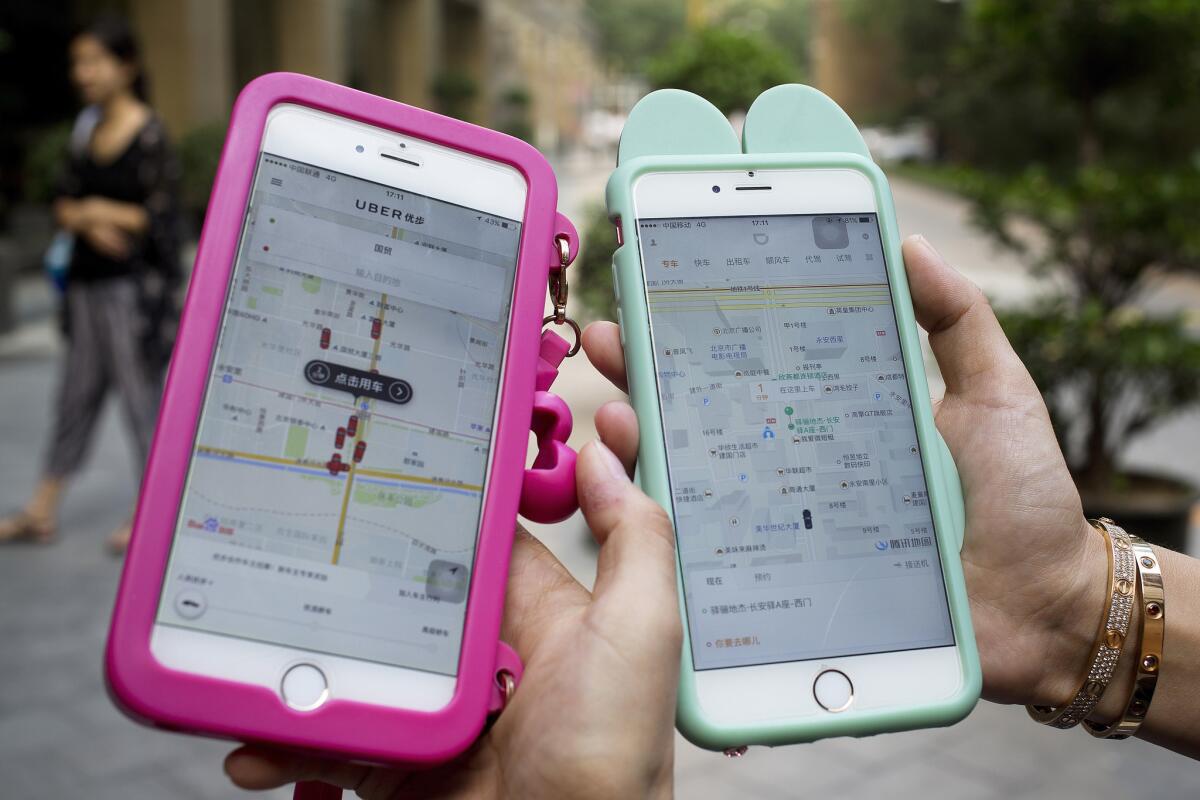Has Uber maxed out on private financing?

- Share via
A billion here, a billion there. For a couple of years, Uber Technologies Inc. steadily collected huge sums of capital every few months to fuel its worldwide expansion.
But as the ride-hailing company achieves profitability in more regions, investor enthusiasm is hitting a plateau, analysts say. Increasing instead is pressure to ride earnings into an initial public offering and generate returns for existing shareholders.
The dynamics in Uber’s fundraising climate came into question this week as the San Francisco company announced its intention to offload its money-losing Chinese operation to Didi Chuxing, the dominant ride-share service in the world’s most populous country.
Analysts have praised the decision, saying Uber had no reason to continue sinking cash into an uphill battle that increasingly looked impossible to win. Nevertheless, the move is a major U-turn for Uber Chief Executive Travis Kalanick. As recently as October, he said 30% of Uber trips occurred in China and that he would continue to spend $1 billion annually to make the “economics” work there.
Since then, Uber may have concluded that not enough investors wanted to prop up the China business, which is separate from but connected to Uber’s global apparatus, observers said.
“Chinese investors, [venture capitalists] and funds would have certainly been keen to invest into Uber Technologies but not solely Uber China,” said Matthieu David of China-based research firm Daxue Consulting.
Efforts to raise funds for Uber China reportedly dragged on longer than planned last year, failed to produce the share prices Uber sought and generated confusion as some investors also backed Didi. Uber plopped down several hundred million dollars of its own money on China during a financing last year to boost investor confidence.
“Uber China hit its max,” said Max Wolff, chief economist at Manhattan Venture Partners, which swaps cash for stock with shareholders in closely held firms. “Uber China went out for a higher valuation and couldn’t get it and then sold [to Didi] for its last valuation at $7 billion. That implies some substantive head winds.”
Uber could not be reached for comment.
Across the rest of the world, Uber’s ability to raise funds remains viable.
“There’s still a lot of people who like Uber and feel a fear of missing out,” Wolff said. “It’s a big name and people hear about it.”
But it’s unlikely that Uber’s share price, and in turn its valuation, will keep rising at the dramatic rates of the last three years, he said. The company’s most recent equity investment — $3.5 billion from a Saudi Arabian public investment fund — maintained Uber’s valuation at $62.5 billion.
Holding the valuation flat “is not a cataclysm, but it certainly suggests the momentum is not the same,” Wolff said.
Last month, the company moved away from issuing shares, instead turning to a high-yield loan to raise an additional $1 billion. The loans typically carry a term of about five years and are given to businesses with regular, predictable cash flows, said Mark Turk, senior market manager at Silicon Valley Bank.
Creativity in fundraising among start-ups isn’t surprising because more of them are staying private longer and, consequently, pricing themselves out of the range of one investor set after another, he said. Companies pursuing their vision seek funds at the lowest costs with the most flexible terms.
Uber is poised to grab another $1 billion from Didi as part of its takeover of Uber China, bringing its lifetime fundraising haul above $12 billion. Didi and some of its investors declined to comment on how the investment agreement materialized.
On the flipside of the transaction, Uber and its shareholders get a nearly 20% stake in Didi. But that comes with less than 6% voting power, another sign of weak leverage in financing negotiations, Wolff said.
Cleaning the China losses off financial statements leaves Uber with adjusted profits — meaning some expenses like taxes are discounted — in North America, Australia and in greater Europe, which includes the Middle East and Africa, according to data reported by the Financial Times this year.
That more positive picture produces “an easier story to tell” investors if Uber seeks to go public, said Alex Castelli, technology and life sciences industry leader at Cohn Reznick. Though Kalanick has sought to delay an IPO for as long as possible, there’s an implied push from investors for Uber to go public sooner so they can spin their freshly liquid returns into other ventures.
Uber still faces regulatory issues such as the level of background checks needed on drivers and whether they can be classified as contractors rather than employees. But the Didi deal removes China as a source of uncertainty, experts said.
Uber’s technology research has the best chance of significantly boosting the company’s valuation and reigniting the financing frenzy, said Jay Ritter, a University of Florida professor who studies IPOs and start-ups.
Uber is positioned to dominate the market for driverless taxis in as much as two-thirds of the world, but it’s unclear whether the company can execute its vision, how soon it could happen and how profitable the automated car business would be.
“The faster those are resolved, the sooner the higher valuations will come,” Ritter said.
Twitter: @peard33




